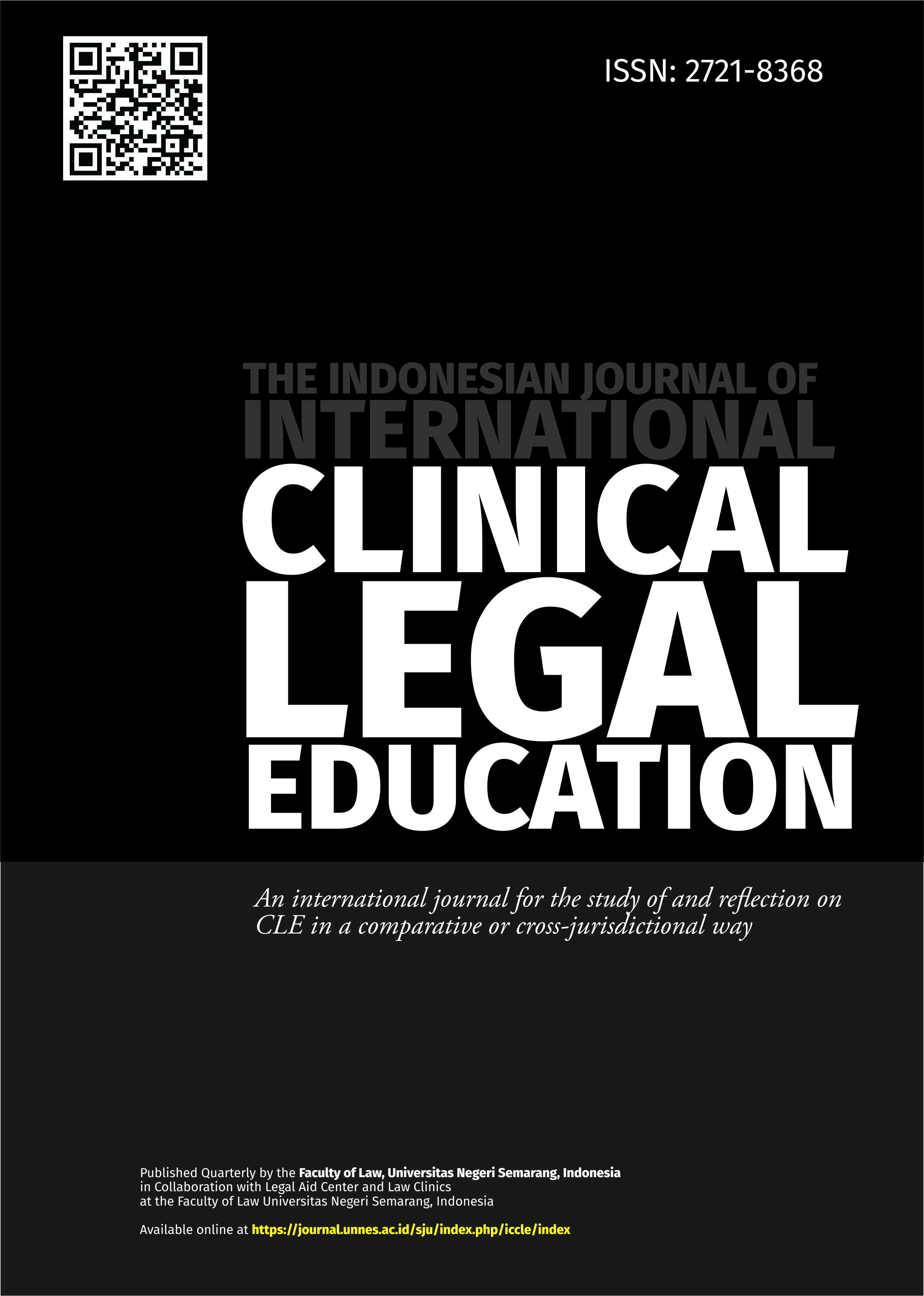Transfer of Undertaking Protection of Employment: Ideas and Praxis
DOI:
https://doi.org/10.15294/iccle.v6i3.14315Keywords:
Outsourcing, Continuity of work, NeoliberalismAbstract
The discussion in this article departs from the issues about the continuity of work of outsourced workers who are trying to be protected by the principle of Transfer of Undertaking Protection of Employment. The articles were prepared non-doctrinally in order to address the issue by incorporating outsourced workers by using the interview method and the statute approach. As a result, the TUPE principle failed to provide protection to outsourced workers. Which failure results from the practice of terminating the work agreement when the contract of business cooperation ends. Furthermore, the protection of the continuity of work for outsourced workers is based only on the moral obligations of the new outsourcing company. Based on the causes of this failure, the development of labour law must impose legal obligations on new outsourcing companies by incorporating the TUPE clause into the contract of business cooperation between the outsourcing company and the user company.
References
Brougton. Precarious Employment in Europe Part 1: Patterns, Trends, and Policy Strategy. Brussels: European Parliament. Directorate-General for Internal Policies, 2016.
Buchari, Imam. “Implikasi Prinsip Transfer of Undertaking Protection of Employment (TUPE) terhadap Hak-Hak Pekerja Berstatus Perjanjian Kerja Waktu Tertentu (PKWT) [Implications of the Principle of Transfer of Undertaking Protection of Employment (TUPE) on the Rights of Workers with Fixed Time Work Agreement (PKWT) Status].” Jurnal Ilmu Hukum Khyadiren 1, no. 2 (2020).
Colling, Trevor. Tendering and Outsourcing: Working in the Contract State?. In Susan Corby and Geoff White (ed.). Employee Relations in the Public Services: Themes and Issues. London: Routledge, 1999.
Constitutional Court Decision Number 27/PUU-IX/2011 on Judicial Review of the Law Number 13 of 2003 on Manpower against The 1945 Constitution of the Republic of Indonesia, January 17, 2011.
Constitutional Court Decision Number 87/PUU-XVIII/2020 on Judicial Review of the Law Number 11 of 2020 on Job Creation against The 1945 Constitution of the Republic of Indonesia, November 03, 2021.
Cooke, Fang Lee, Jill Earnshaw, Mick Marchington, and Jill Rubery. “For Better and For Worse: Transfer of Undertakings and the Reshaping of Employment Relations.” International Journal of Human Resource Management 15, no. 2 (2004).
Davidov, Guy and Brian Langille. Boundaries and Frontiers of Labour Law (Goals and Means in the Regulation of Work. Oregon: Hart Publishing, 2006.
Forde, Chris. “Temporary Arrangements: The Activities of Employment Agencies in the UK.” Work, Employment, & Society 15, no. 3 (2001).
Grewal, David Singh and Jedediah Purdy. “Introduction: Law and Neoliberalism.” Law and Contemporary Problems 77, no. 4 (2014).
Harvey, David. A Brief History of Neoliberalism. New York: Oxford University Press, 2005.
Herlambang, Pratama Herry. “Implementation on Transfer of Undertaking Protection of Employment to Outsourcing Labour in Semarang Indonesia: A Legal Approach.” Journal of Indonesian Legal Studies 3, no. 1 (2018).
Hernawan, Ari. “Hukum dan Kekuasaan dalam Hubungan Industrial [Law and Power in Industrial Relations].” Jurnal Mimbar Hukum, edisi khusus, (2011).
Herod, Andrew and Rob Lambert. Neoliberalism, Precarious Work and Remaking the Geography of Global Capitalism. In Rob Lambert and Andrew Herod (ed.). Neoliberal Capitalism and Precarious Work: Ethnographies of Accommodation and Resistance. UK: Edward Elgar, 2016.
Houseman, Susan N, Arne L Kalleberg, and George A Erickcek. “The Role of Temporary Agency Employment in Tight Labor Markets.” Industrial and Labour Relations Review 57, no. 1 (2003).
Houseman, Susan N. “Why Employers Use Flexible Staffing Arrangements: Evidence from an Establishment Survey.” Industrial and Labour Relations Review 55, no. 1 (2001).
Hveem, Joakim. “Are Temporary Work Agencies Stepping Stones into Regular Employment?” IZA Journal of Migration 21, no. 2 (2013).
Interview with outsourcing workers 1 on December 16 2022.
Interview with outsourcing workers 2 on December 16 2022.
Interview with outsourcing workers 3 on December 16 2022.
Irianto, Sulistyowati. Praktik Penelitian Hukum: Perspektif Sosiolegal [Legal Research Practice: Sociolegal Perspectives]. In Sulistyowati Irianto and Sidharta (ed.). Metode Penelitian Hukum: Konstelasi dan Refleksi [Legal Research Methods: Constellations and Reflections]. Jakarta: Yayasan Pustaka Obor Indonesia, 2013.
Irwansyah. Penelitian Hukum: Pilihan Metode & Praktik Penulisan Artikel [Legal Research: Choice of Article Writing Methods & Practices]. Yogyakarta: Mirra Buana Media, 2020.
Janssen, Ronald. Precarious Work Makes for a Precarious Recovery. In Nicolas Pons-Vignon (ed.). There is An Alternative: Economic Policies and Labour Strategies Beyond the Mainstream. Geneva: International Labour Office, 2011.
Kalleberg, Arne L. “NonStandard Employment Relations: Part-time, Temporary and Contract Work.” Annual Review of Sociology 26, (2000).
Kant, Immanuel. The Metaphysics of Morals, New York: Cambridge University Press, 1991.
Keller, Berndt and Hartmut Seifert. “Atypical Employment and Flexicurity.” Management Review 16, no. 3 (2005).
Kementerian Koordinator Bidang Perekonomian Republik Indonesia. “Naskah Akademik Undang-Undang Nomor 11 Tahun 2020 tentang Cipta Kerja”. Diakses melalui laman https://uu-ciptakerja.go.id/naskah-akademis-ruu-tentang-cipta-kerja/, pada tanggal 8/11/2022.
Marx, Karl. Capital I. London: Lawrence & Wishart, 2010.
Mikus, Marek. “The Justice of Neoliberalism: Moral Ideology and Redistributive Politics of Public-Sector Retrenchment in Serbia.” Social Anthropology 24, no. 2 (2015).
Palley, Thomas I. From Keynesianism to Neoliberalism: Shifting Paradigms in Economics. In Alfredo Saad-Filho and Deborah Johnston (ed.). Neoliberalism: A Critical Reader. London: Pluto Press, 2005.
Rompoti, Eleni, Alexis Ioannides, and Theodoros Koutroukis. “Employment Flexibility and Industrial Relations Reforms in Greece of Memoranda.” E-Journal of International and Comparative Labour Studies 11, no. 2 (2022).
Serrano, Melisa R. From Standard to Non-Standard Employment: The Changing Patterns of Work. Dalam Melisa R Serrano. Between Flexibility and Security: The Rise of Non-Standard Employment in Selected Asean Countries. Jakarta: ASEAN Services Employees Trade Unions Council. 2014.
Standing, Guy. “Globalization, Labour Flexibility and Insecurity: The Era of Market Regulation.” European Journal of Industrial Relations 3, no. 7 (1997).
Stanworth, Celia and Janet Druker. “Dimensions of Employers’ Use of Temporary Agency Labour in the UK.” Personnel Review 35, no. 2 (2006).
Steger, Manfred B and Ravi K Roy. Neoliberalism: A Very Short Introduction. New York: Oxford University Press, 2010.
Sudiarawan, Kadek Agus. “Pengaturan Prinsip Transfer of Undertaking Protection of Employment (TUPE) dalam Dunia Ketenagakerjaan Indonesia: Di Antara Potensi dan Hambatan [Setting the Principles of Transfer of Undertaking Protection of Employment (TUPE) in the World of Indonesian Employment: Between Potentials and Obstacles].” Jurnal Magister Hukum Udayana 4, no. 4 (2015).
Supreme Court Decision Number 290 K/Pdt.Sus-PHI/2018 of Industrial Relations Disputes between Hadi Iswanto and Sugiono against PT Prima Persada Nusantara and PT Haleyora Powerindo, Kasasi, April 10, 2018.
Suryomenggolo, Jafar. “Labour, Politics, and the Law: A Legal-Political Analysis of Indonesia’s Labour Law Reform Program.” Labour and Management in Development 9, (2008).
Suyoko and Mohammad Guhron AZ. “Tinjauan Yuridis terhadap Sistem Alih Daya (Outsourcing) pada Pekerja di Indonesia [Juridical Review of the Outsourcing System for Workers in Indonesia].” Jurnal Cakrawala Hukum 12, no. 1 (2020).
Syahwal. “Paradigm of Application of the No Work No Pay Principle in Determining Process Wages.” Jurnal Penelitian Hukum de Jure 23, no. 2 (2023).
Tjandra, Surya. “Understanding Workers’ Law Reform in Indonesia 1998-2004.” Labour and Management in Development 9, (2008).
United Nations Committee on Economic, Social and Cultural Rights. Second Periodic Report Submitted by Indonesia Under Articles 16 and 17 of the Covenant, due in 2019. 30 Juli 2021. E/C.12/IDN/2.
Venugopal, Rajesh. “Neoliberalism as a Concept.” Economy and Society 44, no. 2 (2015).









